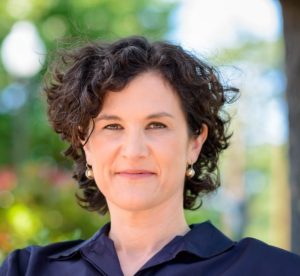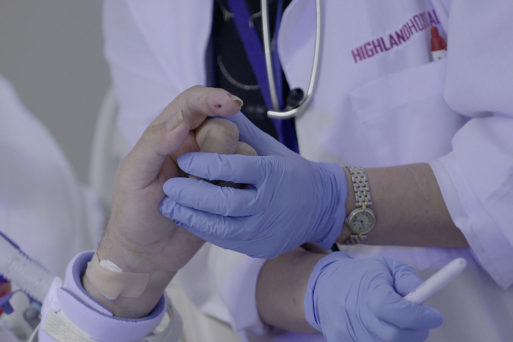
Jessica-Nutik Zitter
Today SevenPonds concludes our interview with Dr. Jessica Nutik-Zitter, M.D. Dr. Zitter is a board certified specialist in both critical care and hospice and palliative medicine and an attending physician in the intensive care unit at Highland Hospital in Oakland, California. She was featured in the award-winning Netflix documentary “Extremis” and is the author of the recently released book “Extreme Measures: Finding a Better Path to the End of Life.”
Kathleen: Do you believe that physicians have an obligation to offer every life-saving option to every patient, regardless of whether the patient will benefit or not? In other words, should the decision to pursue extreme measures be in the hands of patients and families or should doctors decide?
Dr. Nutik-Zitter: I don’t believe that patients should be put in the position of making medical decisions, no. They should be part of the decision making process, but we doctors went to medical school. We’re the experts, at least in the patient’s disease. But the patients are the experts on their lives and their values and what’s important to them.
The way to bring those pieces of the puzzle together is to have open conversations about expectations, preferences and goals of care. That means doctors must be open and honest about the potential benefits and harms of any proposed treatment, and patients and their surrogates must be willing to hear the truth. It means looking at the disease trajectory and knowing when the time has come to shift gears. I find that treatment decisions become easier when they’re approached in this way.
Kathleen: So, it really is about having hard conversations.
Dr. Zitter: Yes, and also acknowledging that they are hard. We tend to see these discussions through the patient’s eyes, which is certainly appropriate. The patient should be the focus in all care decisions. But these discussions are incredibly stressful for doctors, too. Physicians are not taught anywhere in their education how to talk to patients about end-of-life goals.
Kathleen: Do you think the medical education system shortchanges doctors by avoiding this subject?
Dr. Zitter: Of course it does. But until the system changes, I believe there are things we can do to help doctors approach the subject of end of life and goals of care. For example, I am part of an initiative called “Vital Talk,” a nonprofit that’s working to help doctors develop these essential communication skills.
Kathleen: What else can we do as a culture and a society?
Dr. Zitter: We need to talk about death much more often than we do now. I and a colleague of mine teach sex education at my daughter’s high school, and we recently asked the administration if we could hold a “death education” class. Fortunately it’s a very progressive school, and they said, “Sure.” So we had a class and talked with high school kids about death.
Kathleen: Wow! What was that like?
Dr. Zitter: It was amazing. The kids were open and curious and very willing to talk about how they felt. They asked insightful questions and listened carefully to what we had to say. It was really eye-opening to see how curious they were. Death is the final frontier in a way…the last taboo. Kids are hungry for information, and we need to offer it.

Credit: mountainx.com
Kathleen: I have often thought that confronting our own mortality is the only way that we can live a truly authentic life — that it’s impossible to truly value life if we haven’t confronted death. Do you agree?
Dr. Zitter: Absolutely. I attended a conference a while back that was led by Mitchell Levy, called “Mindfulness in the ICU.” Mitchell is an ICU physician and a long-time practitioner of Buddhism who is also working to help change our attitudes and approach to end of life.
He began the session by asking the audience to close our eyes and imagine our own death in detail — how would we be dying; who would be there; how we would feel; how our loved ones would feel. It was a deeply moving experience. I was sitting there with tears pouring down my face.
So, yes. I believe that until we accept death as part of the continuum, until we truly accept that this life we are living will one day end, we can’t really know what we value, or act in a way that’s consistent with what’s most important to us at the end of life.
Kathleen: That’s a wonderful goal. But how do we get there? Do you have any advice for our readers about what steps they can take?
Dr. Zitter: Yes, I do. There are three steps I think each of us needs to take if we want to avoid the end-of-life conveyor belt and have the opportunity for a good death. I call them the three “C’s.”
No. 1: Confront death. Accept that you are not immortal, and that life is not infinite. Let go of the fantasy that you can live forever. You can’t.
No. 2: Communicate your preferences and values to your doctors and your loved ones, who may be making decisions for you if you can’t speak for yourself. Make it clear what you want and do not want if you are seriously ill and approaching the end of life. At the same time, be open to hearing bad news. You can’t plan for a good death if you don’t know you’re dying.
No. 3: Collaborate. Patients, families and doctors must work together as a team to define goals of care. This collaboration should be ongoing and fluid. The time to begin the discussion is not in the ICU.
Kathleen: Thanks so much, Dr. Zitter! It’s been a pleasure speaking with you.
Dr. Zitter: You’re very welcome.
Note: If you missed the first part of our interview with Dr. Nutik-Zitter, read it here.

 How Can Palliative Care Be Implemented in the ICU?
How Can Palliative Care Be Implemented in the ICU?


 Forest Bathing Eases Grief by Soaking in Nature
Forest Bathing Eases Grief by Soaking in Nature
 The Spiritual Symbolism of Cardinals
The Spiritual Symbolism of Cardinals















